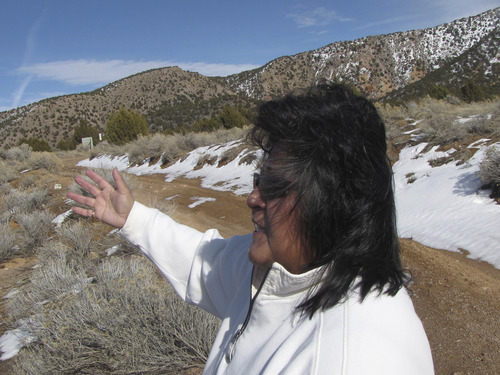This is an archived article that was published on sltrib.com in 2011, and information in the article may be outdated. It is provided only for personal research purposes and may not be reprinted.
Cedar City • Lora Tom looks at a plot of land covered with piñon-juniper trees and sees the key to the economic future of the Cedar Band of Paiutes.
Tom, chairwoman of the Cedar Band, said for nearly two decades the band has planned to build a travel center on reservation land six miles south of Cedar City on Interstate 15. The center would include stores, restaurants and fueling services for vehicles ranging from semitrailers to automobiles.
But Tom said the band has hit a roadblock in the Legislature, where a bill that would allow the group to keep a portion of fuel taxes generated by the travel center has stalled. SB122 would give the band an exemption already enjoyed by Utah's Ute and Navajo tribes for at least 10 years.
"I'm disappointed," said Tom. "The state says it always wants to help [tribes] with projects but never shows action. It's always a battle. … Their words are hollow."
The original version of SB122 would have allowed the Paiute band to keep the entire 24.5-cent tax the state applies to every gallon of fuel sold. Normally, the state keeps 70 percent of the money, with the rest going to counties and cities. The Legislative Fiscal Analyst estimated it would mean a loss of $1.4 million to the state's transportation fund in fiscal 2012 and $1.9 million in 2013.
But Tom said that after SB122 was introduced, it was amended so the state would keep its normal share of 70 percent of the tax, with the other 30 percent going to the tribe. Travis Parashonts, the CEO of Cedar Band Enterprises, which explores business opportunities for the band, said the 30 percent could generate $600,000 annually for the tribe.
The county and Cedar City support the band's efforts because if granted the exemption, the band would assume maintenance of roads and other infrastructure that local road departments are now responsible for, said Mark Echo Hawk, the Pocatello, Idaho, lawyer who helped draft the legislation.
The money would have also been funneled to projects designed to improve life on the reservation in Cedar City, where 17 percent of the band's more than 200 members are unemployed and average income dips below the state's poverty line for most.
While the band could use its authority as a sovereign nation to impose its own tax, that would mean double taxation and is not economically feasible, said Tom. The band is required to charge the state tax so it won't undercut other businesses off the 2,045-acre reservation.
Iron County resident and Republican Sen. Dennis Stowell, who has sponsored the exemption legislation two years running, said the latest bill died in committee, because members still have questions about its legality and loss of revenue.
While he is also disappointed the bill failed to advance, he plans to revive it for further discussion during legislative interim sessions.
He said the Cedar Band, along with the other four bands that make up the 860-member Paiute Tribe in Utah, has no economic prospects. "It would be healthy for the Paiute people. I favor the education, services and jobs it would create."
In a letter to Gov. Gary Herbert and Lt. Gov. Greg Bell expressing the band's frustrations, Tom said she was "optimistic" the band would ultimately prevail.
A spokesperson for Herbert said the letter was received Wednesday and had not reached the governor's desk as of Friday.
"Moreover, SB122 appears to have stalled in the Senate Rules Committee, so it is not yet a matter on which he might take action," said spokeswoman Allyson Isom.
"As the founder of the Native American Summit six years ago, Governor Herbert is deeply committed to working with all tribes in their efforts toward economic development. He has been consistently committed to working in a constructive government-to-government relationship with the sovereign Native American Tribes of Utah."
Parashonts, the CEO of Cedar Band Enterprises, praised Stowell's efforts and said the tribe has worked for 17 years exploring different financial options for building the travel center, expected to cost more than $10.5 million.
The tribe is moving forward with construction and finalizing plans to apply for newly created tax-exempt tribal economic development bonds that are part of the stimulus bill passed by Congress.
Parashonts said he is "baffled" as to why the state is reluctant to give the band the same exemption enjoyed by the Utes and Navajos.
The Navajo tribe's motor fuels tax exemption has been in place since 2001, while the Utes' dates to 2000, according to Echo Hawk.
Attempts to reach the Ute and Navajo tribes on Friday were unsuccessful.
Echo Hawk said there should be no question about the legality of the proposed exemption.
"Objections that the [bill] is unconstitutional are unfounded as its constitutionality has been tested," he said.



